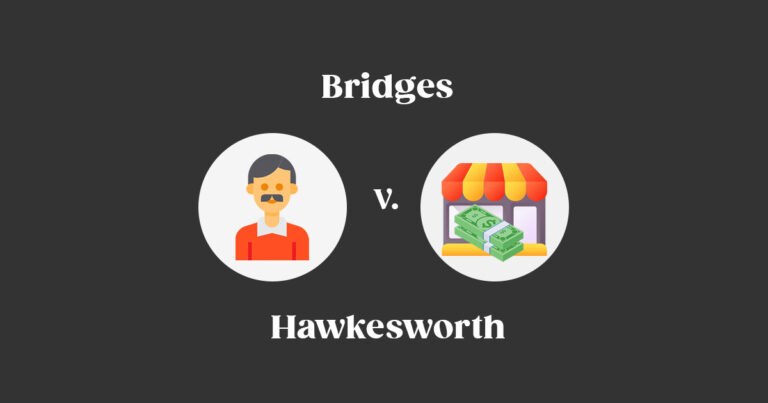Quick Summary
Bridges (the plaintiff) found a large sum of money on the floor of Hawkesworth’s (the defendant) shop and entrusted it to him, assuming he would return it to the rightful owner. However, three years passed, and no one claimed the money; therefore, Bridges asked for its return, but Hawkesworth refused. Bridges then legally claimed the money, and Hawkesworth appealed the lower court ruling.
The court ruled that discovering a lost item on someone’s property doesn’t grant ownership rights to the owner, and the person who found it may be able to claim ownership. The shopkeeper does not obtain ownership rights over a lost item that they did not find themself, and according to the rule of law, which states: “If you can’t find the owner only after a certain period of time, often referred to as a ‘waiting period’ or “statute of limitations”, you may have a right to keep the property.”
And therefore, Bridges was entitled to its return, as Hawkesworth was only keeping the money to find its rightful owner.
Rule of Law
The discovery of a lost item on someone’s property does not automatically confer ownership rights, and if the legal owner never claims it, the person who found it may be able to claim ownership through a legal process.
Facts of the Case
Bridges (plaintiff) was a traveler who did business with Hawkesworth (defendant) at his shop. On one occasion, Bridges discovered a large sum of money on the floor of the Hawkesworth shop. He trusted that the defendant would return the bank notes to their rightful owner, so he gave them to him.
No one came forward to claim the notes after three years. Finally, the plaintiff requested the return of the notes, but the defendant refused. Bridges successfully prosecuted for the legal right to these notes. The defendant appealed the ruling.
Issue
Does discovering a lost item inside a store give the owner the right to keep the item, despite a claim by the person who discovered it?
Holding and Conclusion
No.
The Court held that a shopkeeper does not obtain ownership rights over a lost item that was not in their possession or under their care. Instead, the person who discovers a lost item acquires ownership of it, subject only to claims of the legal owner.
Reasoning and Analysis
The Court reasoned that the money never belonged to Hawkesworth because he did not find it in the first place and furthermore, the defendant was not liable for the notes because the rightful owner had not given them there on purpose.
The Court applied the rule established in Armory v. Delamirie, which holds that the finder of a lost object holds title to it subject only to the rightful owner’s claims. Therefore, Hawkesworth had no right to keep the money, and Bridges was entitled to its return.
Relevant FAQs of this case
How long must a person wait before they can claim ownership of a lost item?
The amount of time a person must wait before they can claim ownership of a lost item depends on the jurisdiction, but it is usually several years.
For example, in some states in the United States, the waiting period is three years.
What is the process for claiming ownership after finding a lost item?
To claim ownership of a lost item, the finder must follow certain legal procedures, such as reporting the item to the authorities, waiting for a certain period of time, and providing proof of their efforts to locate the original owner.
For example, if someone finds a wallet in a park, they might turn it into the local police station and wait for a certain amount of time before being allowed to claim it as their own.
What factors can influence the decision of a court in a dispute over ownership of a lost item?
Several factors can influence a court’s decision in a dispute over ownership of a lost item, including the circumstances under which the item was lost or found, the length of time that has passed since the item was lost, the efforts made to locate the original owner, and any relevant laws or regulations in the jurisdiction.
For example, if a lost item is found in a public place and all efforts were made to locate the original owner, a court may rule in favor of the finder as the rightful owner after a certain period of time has passed.
Was this case brief helpful?
